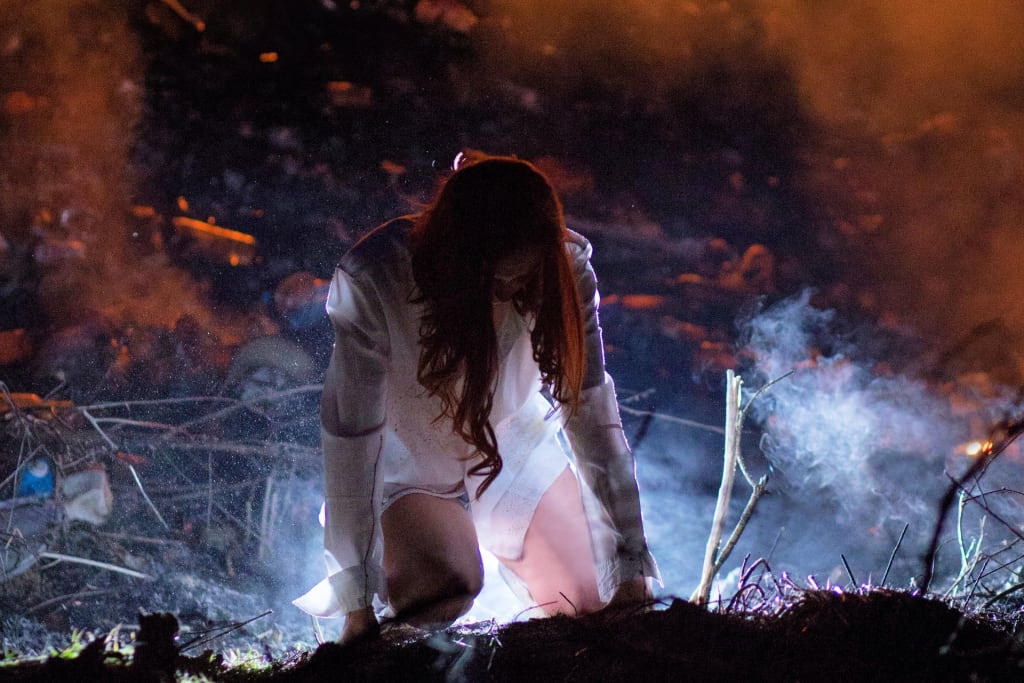
I was told humans weren’t always idiotic fools.
I was told we once cared about the place we call home. My mother passed down the little knowledge she was given from her mother—and her mother before her—about the creatures that once roamed this now sullied planet. We once valued nature, we once valued choices.
I scoff at the thought. Choices.
“NUMBER 28”. The sound of speakers boom across the now-full street. I watch as a hunched man steps forward, his gray jacket, like mine, is broken in several places, but unlike mine—his hands shake. He steps through the radiation detectors, visibly holding his breath as he awaits the machine’s death call.
Seconds pass.
The machine's silence indicates the man is cleared to go through the market gates. His whole body begins trembling, more so now than before.
Trembling from hunger, I realize.
“Wonderful, lovely, Elios”, I mutter under my breath, low enough for the bâton rouge guard not to overhear and surely beat me half to death. Pigs.
Hunger, thirst, anxiety, depression. That is what has become of us since the 4th war.
In the darkest hours of the night, my mother used to whisper of humans who once could buy food, clothes and access healthcare with money—and only money. My older sister and my 12-year-old self had gawked and marvelled at the simplicity of it all. In our part of the divided world—Elios—we have rations, quotas. Money and proof of need are required to obtain anything, especially food. A family’s size will determine how much food they are allowed to be given.
We used to be a family of four. That meant that we were privy to twelve slices of stale bread and a litre of cow milk once a month. Once a week we were rewarded with a pound of rice, beans, tomatoes and twelve eggs. If anyone tries to get more food by their own means, they are disposed of. In a specific way.
The Bâton Rouge death.
The name stuck after a guard, years ago, caught a 60-year old man stealing tomatoes. Thievery goes against Elios’s laws of reform. The old man spoke no English, but the officer didn’t care to hear his explanation for the illegal activity. His red baton came down on the old man’s neck first. Then he proceeded to hit other parts of his body, breaking bones and bruising as he hacked away—a crowd gathered around the massacre. The man’s pleas were heard by many, two words audible in his gargled speech: “bâton rouge”. Horrifyingly, since then, all guards stationed in Elios have carried a red baton to honour the most sadistic of all. As I like to call them, the pigs hit and torture people whenever they wish and publicly execute thieves or rule-breakers by repeatedly pounding and bashing their skulls in.
There is no mercy in Elios, and there hasn’t been for four generations.
Horror and disgust coil at my gut as I watch ahead, aware of the smoke polluting the air and the grey opaque scenery that is constant throughout this godforsaken continent.
A sudden movement catches my attention—the hunched man is exiting the market gates. I watch as he hobbles out, hands worn from hard labour. His rations seem to be just enough to feed one person.
He’s alone then.
The thought doesn’t shock me, what does shock me is that he managed to stay alive well past his midlife. I should corner him, force him to give me any means for survival. Maybe there is something I’ve missed. Some way to charm the important people, a right pig to talk to?
Even as I repeat the words in my head, I know they’re of no use. I’ll likely be dead in five years, just shy of my 26th birthday. Besides, I’d rather die by starvation or the biting winters than by the hand of bâton rouge.
“NUMBER 29”. The ignorant pig calls out, red baton swinging in hand—a stark contrast to the black of his uniform.
I watch as a boy—no more than 16—moves through the detectors. The alarms rarely ever go off anymore. They are supposed to detect any left-over radiation from the 4th war, but anything can set them off now, even temperature changes.
Before my mother died, she said humans were once advanced and had technologies. These detectors are about the last technology we now possess. School classrooms do not teach about them, no one does. It is strictly forbidden to use or make any of it. We instead learn of the history and simple mathematics from the books that survived the nuclear attacks.
I try not to marvel at how free humans used to be, if only because it pains me knowing I could be killed for reading and no one would bat an eye. Not that anyone can—my parents and sister passed from the common virus three years ago and since speaking to the wrong person could cost my life, I keep quiet.
Friends are dangerous. Trusting people is dangerous. You must always wear steel armour so their knife breaks once they plunge it in your back. Betrayals happen every week, every day. Desperate fools sell their friends out, and often family, just so they can get more food or clothes, or perhaps just to be in the favour of the guards.
I don’t blame them, not really. I understand the desperation and the will to survive. But I do pity their weakness and selfishness—their overly eager glances knowing their actions are what causes the guard to execute the bâton rouge death.
Disgusting.
The kid steps out with a slightly bigger bag.
A family of four then. The maximum a family is allowed to be.
Envy and longing rip at my heart, threatening to expose tears.
Look away, look away, look away.
“NUMBER 30”. The gross pig billows out again, setting down the speaker once his words have finished echoing.
I look at my number: 31. I’ll be going next.
Today I will be getting my week’s worth of rice, beans, eggs and tomatoes. The mere thought of a little more food makes my stomach churn in anticipation. Resources have been scarce recently, even by my standards. My job of sweeping the markets, and sometimes streets, pays just enough to buy the rations I need to survive—
A loud wail goes off, deafening all of us in line. Putting my hands to my ears, I watch as the guards check the source of the sound.
More than three rush over, the sound-amplifying and echoing.
Idiots, check the monitors, not the speaker.
The sound pours into every street, every corner.
Make it stop, make it stop, make it stop.
A break in the noise signals the machine has started to cool.
Yes, finally. A temperature malfunction then. The girl would have been taken right away if it hadn’t been.
I watch as she passes through the market gates, her gaze fluttering across the guards’ faces as if she isn’t sure she has been cleared to go through. After no one stops her, she ventures in.
The doors are sealed shut behind her.
I look around too, many of us are sitting on the street now—only the young seem to be standing. The heat of the sun is pounding down hard, masking us all in sweat. I begin removing my tattered jacket, my slightly damp hair sticking to my locket. I pry my hair off it and quickly fit it into a ponytail.
It was my mother’s. The locket. She wore it every day I knew her, even to bed. I never asked who gave it to her, but deep down I always assumed my father had as he often watched the delicate thing, deep in thought. I used to think it was the odd shape of the number three, but as I took a closer look, it took the form of a lopsided heart. Beautiful and golden.
For the first time in the three years since they died, I was brave enough to wear it today. It used to overwhelm me—could see how my mother used to touch it for reassurance, how she’d sing and clasp her locket as if remembering something, a simpler time perhaps. I would see our uncanny similarities in the mirror and set it down right away.
But, not today.
I watch as the pig walks closer to me. Curious, I look him in the eye. Perhaps I’ll recognize him, there are a few bâton rouge guards that used to do their schooling with me.
As I meet his stare, I know he isn’t anyone I know.
His grey eyes bore into mine, roaming over my face for recognition. I look away before he has the sense to call my stare treason and beat me for it. I’ve had enough bruises and broken bones for a lifetime. Instead, I notice the girl leave.
Family of three.
I hear the guard bring the speaker to his mouth and bellow, “NUMBER 31”.
Move.
My legs react on instinct, moving forward. I glance at him, he is directly a few feet in front of me. I hope the glare of the sun prevents him from seeing my gaze as I take him in. His grey eyes find mine again, aware this time. I watch as his gaze slides down, down, to my neck.
The blush creeping up is evident—the self-awareness and fear now marking their spot across my skin. His eyes fixate on the locket and a frown crosses his features.
Nervous, but choosing to ignore it, I walk on.
Thoughts of food consume me as I walk past him. The radiation machine looms closer—
A hand catches my arm,
“Don’t move.”
About the Creator
Sadé Díaz
Because life is too short.






Comments
There are no comments for this story
Be the first to respond and start the conversation.